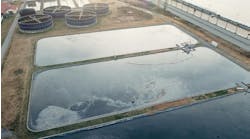The Carbon Disclosure Project (CDP), London, has released its Global Water Report 2014. The CDP, which compiles the report on behalf of 573 investors with $60 trillion in assets, asked more than 2,200 companies around the world — double the number queried in 2013 — to provide information related to water. It received 1,064 responses, an increase of 79% from last year. The report focuses particularly on the inputs from firms on the Financial Times Global 500. The CDP sent requests for information to 302 of these companies, the ones in sectors highly vulnerable to challenges posed by water issues. A total of 174 (58%) of the firms responded.
[pullquote]
“Leading companies increasingly recognize that business-as-usual approaches to water management are no longer sufficient. A shift in practice is required if companies are to realize the true benefits of water stewardship, achieve business resilience and competitive advantage,” notes Paul Simpson, CEO of the CDP, in the report.
Two-thirds (68%) of respondents stated that water poses a substantive risk to their business. Moreover, nearly a quarter (22%) said water-related issues could limit the growth of their business. One third of these respondents expected to face such a constraint in the next 12 months.
The top driver of risk is water stress or scarcity, which was cited by 43% of respondents; 28% mentioned flooding, 16% drought, 14% declining water quality and 13% regulatory uncertainty.
Only 38% of respondents said they evaluated water risks in both their own operations and their supply chain. Moreover, 60% admitted they don’t require key suppliers to disclose the water risks they face.
The CDP report breaks down responses by group; chemical companies are in its “Materials” group. Of the 22 Global 500 companies in the group that responded, chemical makers comprised the largest segment (11), followed by metals and mining (10) and then construction materials (1). The response rate of chemical firms (79%) was among the highest in the survey. Chemical companies that provided information include BASF, Bayer and DuPont.
Key findings for the group included:
• 45% of respondents have suffered negative impacts related to water in the last reporting year, a percentage far higher than the average of all respondents (30%), and the second highest of all sectors.
• 32% have conducted a thorough water risk assessment incorporating both direct operations and supply chain.
• 86% have established specific water targets or goals this year.
• 64% said that water risks impacted their operations, while 23% foresaw such risks in their supply chains.
• 32% required suppliers to report on water.
• 64% noted that water commands board-level oversight.
A majority of chemical industry respondents (54%) pointed to physical issues such as increased water stress or scarcity as the top driver for risk; 33% cited regulatory concerns such as greater difficulty in getting operating permits; and 7% mentioned potential damage to their company’s reputation.
Many also expected water concerns to provide opportunities: 45% foresee sales of new products and services; 41% hope to realize cost savings; and 27% expect enhanced brand value.
The CDP Global Water Report 2014 is downloadable via http://goo.gl/5iPFGb. For details on the findings in earlier CDP Water Reports, see “Sustainable Water Management: The Tide is Turning,” and “CDP Releases Second Annual Water Report."
MARK ROSENZWEIG is Chemical Processing's Editor in Chief. You can email him at [email protected]



